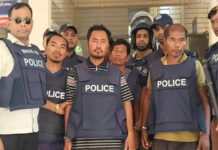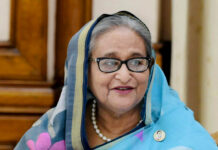The prime minister, Sheikh Hasina, on Monday inquired about the modalities of the ‘spent fuel management’ of the $12.65 billion Rooppur Nuclear Power Plant Project being implemented with the technical and financial supports from Russia. She picked up the issue during an informal discussion while chairing the weekly cabinet meeting at the cabinet division. Referring to recent media reports, she said that she had raised the issue before the signing of the deal with Russia for the construction of the country’s first ever nuclear power plant in Pabna as the country had no experience in handling such a sensitive matter, according to a minister. Science and technology minister Yeafesh Osman replied that Russia would take away all the spent fuel of the nuclear power plant from Bangladesh as per the agreement signed between the two countries in 2011. He however, said that they would work out modalities for removing the spent fuel of the nuclear power plant in keeping with the agreement, according to sources present at the meeting. A senior official at the science and technology ministry said that Bangladesh, as a signatory to the non-proliferation treaty, would not be allowed to manage the spent fuel usually used for preparing the nuclear bombs. Russia has agreed to provide 90 per cent of the cost in loan for the construction of the two-unit power plant with 2,400MW capacity scheduled to begin in December. Russian state-run company Atomstroyexport is the contractor for Bangladesh’s biggest ever project. Principal secretary to the Prime Minister’s Office Md Abul Kalam Azad informed the cabinet meeting that the PMO had prepared a 60-page reply to UNESCO’s concern over the construction of the Rampal coal-fired power plant near the world’s largest mangrove forest Sundarbans, a senior minister told New Age. The UNESCO has recommended that Bangladesh should shelve the Rampal power plant, fearing the project would cause irreparable damage to the forest regarded as the world’s heritage site. A three-member UNESCO expert team which visited Bangladesh in March made the appeal in its report submitted to the government in September. The principal secretary said that they had prepared the replay with inputs from three ministries — power, environment and water. The government has said that it would go ahead with the project despite protests from green activists and objections raised by the UNESCO.
Source: New Age









